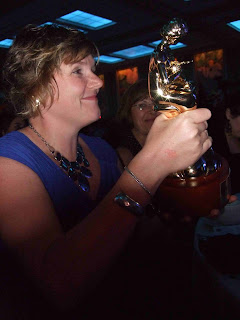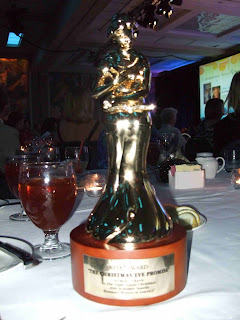I've been thinking a lot lately about world building, but not so much about the how-to advice like: first you draw a map of your world and then decide how your creatures procreate and you figure out their religion, etc, etc.
All that stuff is great and fun, (except maybe the map drawing, that's a little to LOTR for my taste), but what I've been thinking about is not only how do you introduce and show your world in your actual story, but how do you explain it. How do you answer the question: What's your book about?
I'm judging a contest right now and boy are some of these writers doing a bad job of it. Either they're explaining too much, or they're leaving out so many important details that it doesn't hang together at all. Describing a story succinctly is always a challenge, but it seems to be a particularly difficult one for writers in the fantasy, paranormal and urban fantasy realms. Because they think they have to describe their world to describe their story. They sometimes think the world is the story and its complexity drives their conflict...
I've read a couple of helpful online posts recently. One was a short "workshop" in the WriteOnCon conference for children's writers that was held last week. The author was suggesting the key to world building was to make sure you show the readers something they recognize (especially if the creatures in your world are creatures we've seen before) and then change certain elements, but make sure you have good reasons/explanations for the changes. Pretty simple but sound advice.
I mean, if you've only read Bram Stoker, you think that anyone bitten by a vampire but not killed will become one. But if you've read Anne Rice, you KNOW that it's more complicated than that and difficult for a vampire to make another vampire. And if you've read J.R. Ward... well you KNOW that everyone else has everything backwards. The vampires are the good guys.
But moving on to the real eye-opener for me...
I saw a post last week (that I can't find now, so I apologize to the writer) which claimed that one of the pitfalls of fiction writing, in general, is that many beginner writers confuse complexity with conflict.
And this not only lit a lightbulb for me, it made me think about recent conversations I've had with Molly and Sinead about the importance of keeping it simple.... (Sinead and I are both working on YA stories with urban fantasy, alternate history, and/or post apocalyptic type settings.)
The insight I got from this post I read was that you can make your world as complex as you like, as long as you know what your key story is and can explain that part simply. It helps if your story fits in well with your world -- hopefully the details of the world make the conflict in the story more believable, or the stakes higher. But I think that might be less important than making sure you have strong conflict regardless of the world... I think you should be able to explain your story without mentioning the world, or much of it...
I mean I wrote an (unsold at this point) manuscript about a male creature and a human woman saving the life of a little girl. And the conflict came from the fact that he couldn't tell the woman why the girl was in danger, or what he was, and the woman couldn't trust him, especially since he kept trying to leave her behind and take the kid, making her wonder whether he was the real danger. Yes, I had a big mythology surrounding it, but at it's core, the world and mythology was almost superfluous to the conflict of the story. (I actually have done a crappy job of describing the story here, because I didn't capture the internal conflicts well, but I think it makes my point.)
Unfortunately, all this thinking has made me realize that I don't have a great snappy one or two sentence description for my latest WIP yet... I do think I've got real conflict... (not just complexity) but I'm having a little trouble seeing through all the complexity to what bits of my story are the key elements, the key sources of real conflict... All I'm seeing right now are the details of my world and all the decisions I need to make about it.
I do think I've got a core story in there... Just not 100% sure what it is, yet, or rather what makes it special/interesting/compelling.
Hope I'm not making a mistake by not figuring this sh*t out first....
Speaking of sh*t.... An aside re: Eileen's famous bestselling cousin and his dad who says sh*t... I saw a funny tweet from @williamshatner the other day. At least from whoever tweets as William Shatner. One never knows. A year or so ago, someone was tweeting as Christopher Walken. The tweets were really too funny and too perfect to really be him. And of course it wasn't. But boy was it funny.
But back to Shatner... His tweet was something like: have just shot an episode of Bleep. Starting to think the bleep they're referring to is slang term and not so much about defecation.
Okay, sorry. I thought it was funny.










